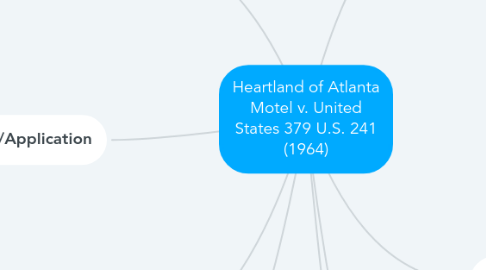
1. Rule of Law
1.1. Congress could use its power to make sure private businesses follow the Civil Rights Act of 1964 and do not use discriminatory practices.
2. Analysis/Application
2.1. The transportation of passengers in interstate commerce is within the regulatory power of Congress, under the commerce clause of the Constitution
2.1.1. The power of Congress over interstate commerce is not confined to the regulation of commerce among the states
2.1.1.1. The district court had upheld Congress' power to regulate interstate commerce under the Commerce Clause and the case was moved to the Supreme Court.
2.1.1.1.1. U.S. Supreme Court rules that Civil Rights Act is constitutional and upholds decision of district court.
2.2. The appellant contends that Congress, in passing the Civil Rights Act, exceeded its power to regulate commerce
3. Impact
3.1. Katzenbach v. McClung, 379 U.S. 294
3.1.1. Court upheld the Civil Rights Act of 1964 for a small local restaurant. The court stated that even though the restaurant's customers were local, it bought much of its supplies through interstate commerce, which falls under the Commerce Clause
3.2. A.L.A. Schechter Poultry Corp. v. United States, 295 U.S. 495
3.2.1. The court ruled that this was an invalid use of Congress' power under the commerce clause
4. Importance
4.1. The Civil Rights Act of 1964 was monumental in establishing precedence and integral to the history of prohibiting racial discrimination in the U.S.
5. Facts
5.1. Parties
5.1.1. U. S. Supreme Court
5.1.2. Owner of Heartland of Atlanta Motel (appellant)
5.2. What Happened
5.2.1. "In the 1950s, the U.S. Supreme Court ruled that racial segregation imposed by the states in school system and other public facilities violated the Constitution."
5.2.2. The Civil Rights Act of 1964 forbade racial discrimination by places of public accommodation if their operations affected commerce.
5.2.3. The Heart of Atlanta Motel refused to rent rooms to African Americans and claimed that Congress exceeded its constitutional authority by passing the Civil Rights Act.
5.2.4. Heartland of Atlanta Motel solicits business from outside the State of Georgia and the majority of its guests are from outside the state.
5.2.5. Heartland of Atlanta Motel claims that Congress has overreached its authority under the Commerce Clause in enacting the Civil Rights Act.
5.2.6. The district court upheld the Civil Rights Act as constitutional. The court of appeals affirmed. The Heart of Atlanta appealed to the United States Supreme Court and Supreme Court upholds the decision.
5.3. Procedural History
5.3.1. Congress may regulate the ability of commercial institutions to deny service on the basis of race under its power to regulate interstate commerce.
6. Issue
6.1. Did Congress, in passing Title II of the 1964 Civil Rights Act, exceed its Commerce Clause powers by forbidding motels of the right to select their customers?
7. Influence
7.1. The Civil Rights Act was a method to enforce equal treatment. After its passing, there have been fewer instances of racial discrimination in public accommodations.
7.2. This case is notorious because it is integral to civil rights legislation in the U.S.
7.2.1. No major legislation in this field had been enacted by Congress for 82 years prior to the passing of the Civil Rights Act

